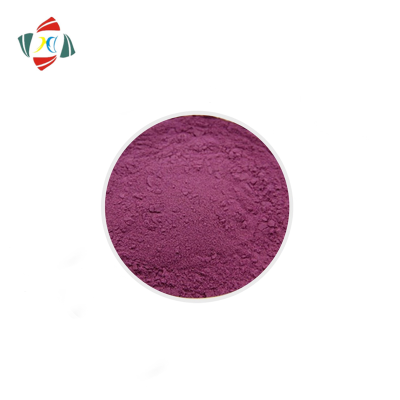-
Categories
-
Pharmaceutical Intermediates
-
Active Pharmaceutical Ingredients
-
Food Additives
- Industrial Coatings
- Agrochemicals
- Dyes and Pigments
- Surfactant
- Flavors and Fragrances
- Chemical Reagents
- Catalyst and Auxiliary
- Natural Products
- Inorganic Chemistry
-
Organic Chemistry
-
Biochemical Engineering
- Analytical Chemistry
- Cosmetic Ingredient
-
Pharmaceutical Intermediates
Promotion
ECHEMI Mall
Wholesale
Weekly Price
Exhibition
News
-
Trade Service
Please click "PlantReports" ↑ above to follow us! Learn about the latest research progress in the field of plant science for the first time! Recently, Meng Xiangzong’s research group at Shanghai Normal University published a research paper entitled Perception of the pathogen-induced peptide RGF7 by the receptor-like kinases RGI4 and RGI5 triggers innate immunity in Arabidopsis thaliana on New Phytologist, revealing the secretion of Arabidopsis thaliana.
The function and mechanism of peptide RGF7 and its receptor in inducing and amplifying plant immune response.
Small peptide signal molecules play an important role in regulating plant growth and immune response.
Studies have shown that the small peptide molecule RGF1 (Root Meristem Growth Factor 1) is specifically expressed in Arabidopsis root tips and is recognized by RGI (RGF1 Insensitive) family receptor-like kinases (RGI1-RGI5), and regulates Arabidopsis root tips.
Stem cell development (Matsuzaki et al.
, 2010; Ou et al.
, 2016).
In this paper, Meng Xiangzong's research group found that the homologous small peptide molecule RGF7 of RGF1 is induced by pathogenic bacteria in Arabidopsis leaves, but RGF1 and other 9 RGF family members are not induced by pathogenic bacteria.
Further research found that the expression of RGF7-encoding gene is positively regulated by the transcription factor WRKY33 and its upstream mitogen-activated protein kinase MPK3/MPK6 and calcium-dependent protein kinase CPK5/CPK6.
Inducing the expression of RGF7 in Arabidopsis transgenic plants can induce a variety of immune responses in Arabidopsis, and can greatly increase the resistance of Arabidopsis to Pseudomonas syringae.
Biochemical and genetic analysis showed that the small RGF7 peptide was recognized by the RGI family receptor kinases RGI4 and RGI5 expressed in Arabidopsis leaves, while the SERK (Somatic Embryogenesis Receptor Kinase) family receptor kinases BAK1 and SERK4 acted as co-receptors.
The body, interacts with RGI4/RGI5 to form a receptor protein complex, and jointly mediates the induction of RGF7 small peptides.
Simultaneous deletion mutations of RGI4 and RGI5 genes lead to a significant reduction of Arabidopsis resistance to Pseudomonas syringae; conversely, overexpression of RGI4 or RGI5 genes can significantly increase the resistance of Arabidopsis to Pseudomonas syringae.
These results indicate that the RGF7 small peptide induced by pathogenic bacteria is a new type of plant endogenous immune inducer, which is recognized by the RGI4/RGI5-BAK1/SERK4 receptor protein complex, which in turn induces the Arabidopsis immune response and enhances its immune response.
Resistance to pathogenic bacteria.
At the same time, the MPK3/MPK6/CPK5/CPK6-WRKY33 signaling module forms a positive feedback pathway that amplifies the plant immune response by inducing the expression of the RGF7-encoding gene (Figure 1).
Figure 1.
The molecular mechanism of the Arabidopsis RGF7 small peptide inducing and amplifying the plant immune response.
Shanghai Normal University and Shanghai University jointly cultivated graduate student Wang Xiaoyang as the first author of the paper, and Professor Meng Xiangzong as the corresponding author.
Professor Li Jia from Lanzhou University provided assistance for this research.
The research was funded by the National Natural Science Foundation of China.
References Wang X, Zhang N, Zhang L, He Y, Cai C, Zhou J, Li J, Meng X.
2021.
Perception of the pathogen-induced peptide RGF7 by the receptor-like kinases RGI4 and RGI5 triggers innate immunity in Arabidopsis thaliana.
New Phytol, https://nph.
onlinelibrary.
wiley.
com/doi/10.
1111/nph.
17197.
Matsuzaki Y, Ogawa-Ohnishi M, Mori A, Matsubayashi Y.
2010.
Secreted peptide signals required for maintenance of root stem cell niche in Arabidopsis.
Science329(5995): 1065-1067.
Ou Y, Lu X, Zi Q, Xun Q, Zhang J, Wu Y, Shi H, Wei Z, Zhao B, Zhang X, He K, Gou X, Li C,Li J.
2016.
RGF1 INSENSITIVE 1 to 5, a group of LRR receptor-like kinases, are essential for the perception of root meristem growth factor 1 in Arabidopsis thaliana.
Cell Res26(6): 686-698.
Click on the lower left corner " Read the original text" to view the full text of the paper.
Press and hold the QR code below to follow Plant Reports! Pay attention to the latest research progress in agricultural science and plant science!
The function and mechanism of peptide RGF7 and its receptor in inducing and amplifying plant immune response.
Small peptide signal molecules play an important role in regulating plant growth and immune response.
Studies have shown that the small peptide molecule RGF1 (Root Meristem Growth Factor 1) is specifically expressed in Arabidopsis root tips and is recognized by RGI (RGF1 Insensitive) family receptor-like kinases (RGI1-RGI5), and regulates Arabidopsis root tips.
Stem cell development (Matsuzaki et al.
, 2010; Ou et al.
, 2016).
In this paper, Meng Xiangzong's research group found that the homologous small peptide molecule RGF7 of RGF1 is induced by pathogenic bacteria in Arabidopsis leaves, but RGF1 and other 9 RGF family members are not induced by pathogenic bacteria.
Further research found that the expression of RGF7-encoding gene is positively regulated by the transcription factor WRKY33 and its upstream mitogen-activated protein kinase MPK3/MPK6 and calcium-dependent protein kinase CPK5/CPK6.
Inducing the expression of RGF7 in Arabidopsis transgenic plants can induce a variety of immune responses in Arabidopsis, and can greatly increase the resistance of Arabidopsis to Pseudomonas syringae.
Biochemical and genetic analysis showed that the small RGF7 peptide was recognized by the RGI family receptor kinases RGI4 and RGI5 expressed in Arabidopsis leaves, while the SERK (Somatic Embryogenesis Receptor Kinase) family receptor kinases BAK1 and SERK4 acted as co-receptors.
The body, interacts with RGI4/RGI5 to form a receptor protein complex, and jointly mediates the induction of RGF7 small peptides.
Simultaneous deletion mutations of RGI4 and RGI5 genes lead to a significant reduction of Arabidopsis resistance to Pseudomonas syringae; conversely, overexpression of RGI4 or RGI5 genes can significantly increase the resistance of Arabidopsis to Pseudomonas syringae.
These results indicate that the RGF7 small peptide induced by pathogenic bacteria is a new type of plant endogenous immune inducer, which is recognized by the RGI4/RGI5-BAK1/SERK4 receptor protein complex, which in turn induces the Arabidopsis immune response and enhances its immune response.
Resistance to pathogenic bacteria.
At the same time, the MPK3/MPK6/CPK5/CPK6-WRKY33 signaling module forms a positive feedback pathway that amplifies the plant immune response by inducing the expression of the RGF7-encoding gene (Figure 1).
Figure 1.
The molecular mechanism of the Arabidopsis RGF7 small peptide inducing and amplifying the plant immune response.
Shanghai Normal University and Shanghai University jointly cultivated graduate student Wang Xiaoyang as the first author of the paper, and Professor Meng Xiangzong as the corresponding author.
Professor Li Jia from Lanzhou University provided assistance for this research.
The research was funded by the National Natural Science Foundation of China.
References Wang X, Zhang N, Zhang L, He Y, Cai C, Zhou J, Li J, Meng X.
2021.
Perception of the pathogen-induced peptide RGF7 by the receptor-like kinases RGI4 and RGI5 triggers innate immunity in Arabidopsis thaliana.
New Phytol, https://nph.
onlinelibrary.
wiley.
com/doi/10.
1111/nph.
17197.
Matsuzaki Y, Ogawa-Ohnishi M, Mori A, Matsubayashi Y.
2010.
Secreted peptide signals required for maintenance of root stem cell niche in Arabidopsis.
Science329(5995): 1065-1067.
Ou Y, Lu X, Zi Q, Xun Q, Zhang J, Wu Y, Shi H, Wei Z, Zhao B, Zhang X, He K, Gou X, Li C,Li J.
2016.
RGF1 INSENSITIVE 1 to 5, a group of LRR receptor-like kinases, are essential for the perception of root meristem growth factor 1 in Arabidopsis thaliana.
Cell Res26(6): 686-698.
Click on the lower left corner " Read the original text" to view the full text of the paper.
Press and hold the QR code below to follow Plant Reports! Pay attention to the latest research progress in agricultural science and plant science!







